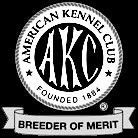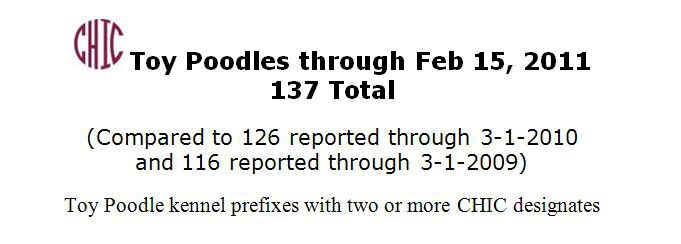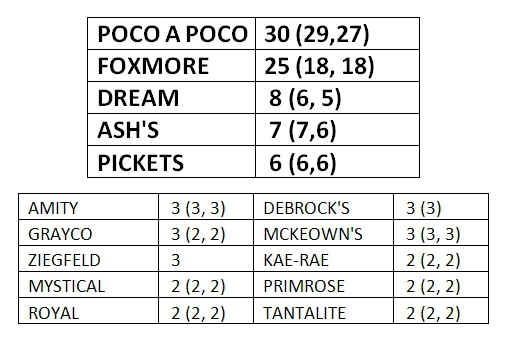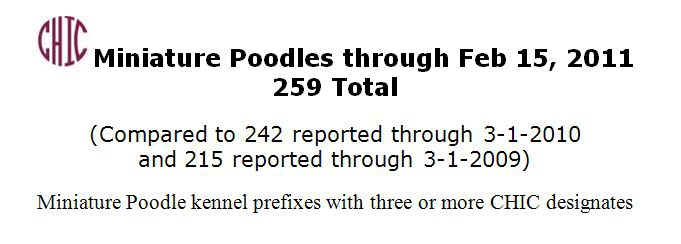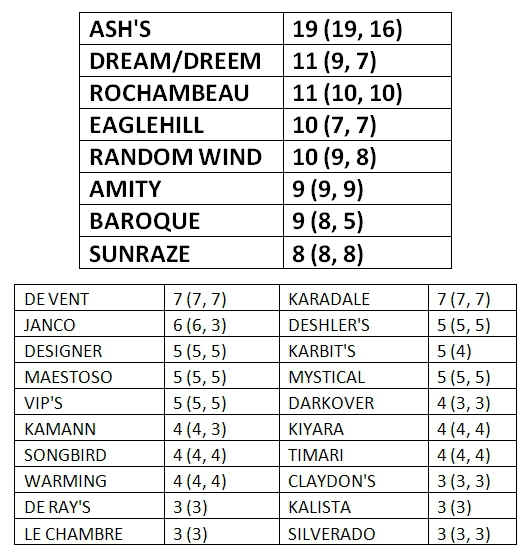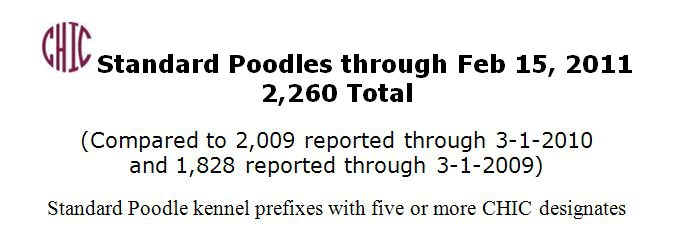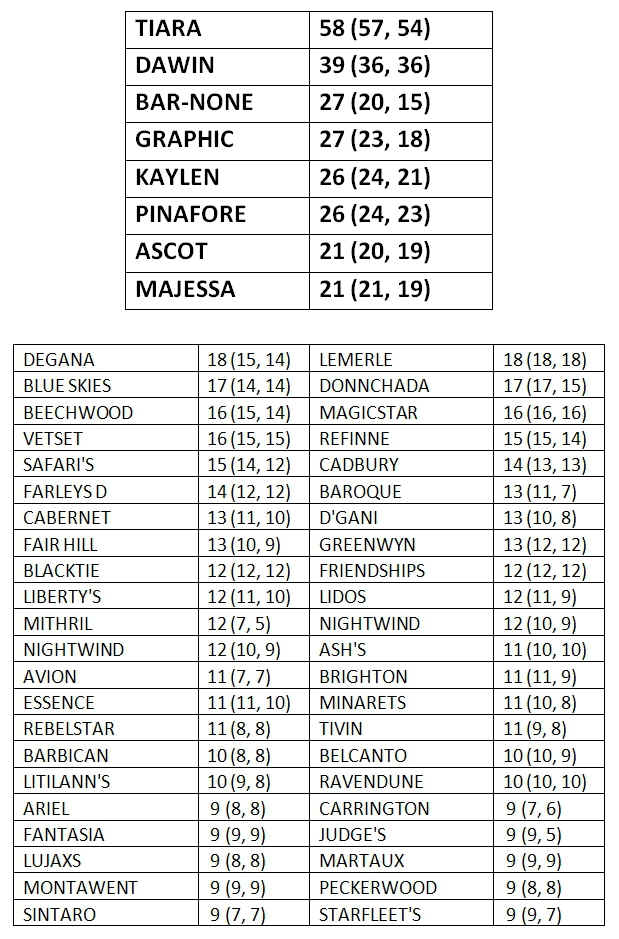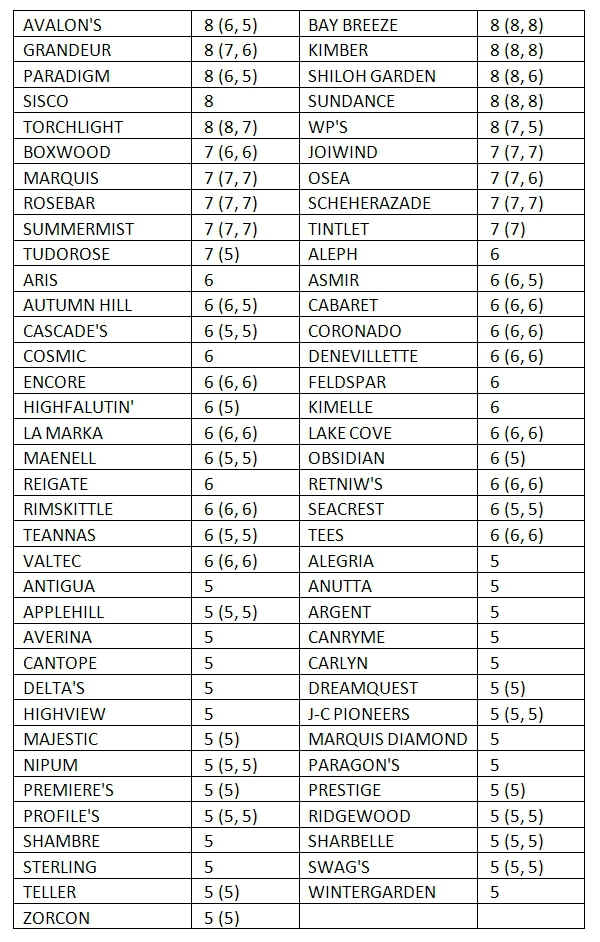|
|
|
Julie
Borst Reed |
|
u |
| u |
| Breeder
Ethics Questionnaire |
| u |
| Puppy Comes Home |
| u |
| u |
| Puppy Temperament Testing |
| u |
| Recommended Diet |
| u |
| FAQs
About Feeding Raw |
| u |
| REAL Dog Food |
| u |
| Fleas 101 |
| u |
| Standard
Poodle Health Concerns |
| u |
| Recommended Vaccination Schedule |
| u |
| Vaccination Decisions |
| u |
| Neutering |
| u |
| Photo Gallery |
| u |
| A Breeder's Life |
| u |
|
Interview
with Dog Breeders' Guild |
| u |
| Poodle Funnies |
| u |
| Tiara Home |
| u |
| u |

|
|
|
Don't
be a victim of an Unethical Breeder – STUDY!
Top Ten Topics (and more) to Learn
The
following are questions that you should ask a breeder before
buying a Standard Poodle. Use this as a tool to make the very
best and educated decision about your new Standard Poodle. Please consider
using a copy of this pamphlet to interview several breeders. Questions
relate to genetically transmitted diseases and anomalies. If discussing
these items over the telephone or in person, the Breeder's answers should
be direct and come easily without hesitation.
This
questionnaire outline was originally produced by the Board of Directors of
the Versatility in Poodles (VIP) association. Tiara Standard Poodle
Breeder, Julie Borst Reed, has been a long-time member in good standing of
VIP. This information has been posted publicly by Tiara Poodles
since VIP first made this outline available to be printed in pamphlet
form. Our answers are published, not to “show-off,” as someone
once wrote to us, but to educate the buying public about the basic
questions one should know in shopping for a Standard Poodle.
Today,
there are many health tests that should be accomplished on dogs that are
going to be considered for reproducing and these tests should also have
been done on many of their relatives; primarily those in the immediate
pedigree. The good as well as the bad results should be seen.
There are no perfect dogs, but it is a good Breeders quest to try to
achieve such a creature. Learn below what questions you should have
answered by a quality dog Breeder offering Standard Poodles.
Breeders' name, address and phone number:
Julie Borst Reed, Kirk S. Reed, Tiara
Standard Poodles
phone
858-488-9500
e-mail tiarapoodles@gmail.com
website: www.tiarapoodles.com
Price of puppy:
$4,000.00. Puppies sold on
AKC limited
registration and are offered to new homes
at 10 weeks of age.
Older puppies on separate terms when available.
Date this pamphlet first posted to Tiara Poodles website 11/17/98
Date of last edit: 12/20/2020
Question:
1. Have the dam and sire had their eyes tested per the Canine Eye
Registration Foundation (CERF)
criteria? This is to
be accomplished regularly; checking for cataracts and other hereditary eye
diseases (once each year for breeding animals). This testing is done
through a licensed, board-certified veterinarian – NOT just the regular
veterinarian, as it takes additional training to be qualified by the
Canine Eye Registration Foundation (based through
Answer from Tiara Standard Poodles:
Yes, for 6
generations+ we have CERF eye certifications accomplished.
Good shoppers, of any breed of dog, should request the AKC # of sire and
dam from the breeder of the litter in which they are interested in
purchasing a puppy OR the exact spelling of the sire and dam’s names.
Type the exact name or number in at http://www.vmdb.org/verify.html
where it says on-line verification and see the certification info.
Eye CERF exams are also accomplished for all Tiara Standard Poodle puppies
before they go to their new homes. The eyes are tested by a
board-certified veterinary ophthalmologist when puppies are 7 weeks of
age. Certifications are mailed into the Canine Eye Registration
Foundation (CERF) within a month of the exam. Owners can check the
link above to see their puppies listed as well as over half dozen
generations of relatives behind their Tiara Standard Poodle who have been
CERF examined and certified.
If answer above is yes, ask if the grandparents had also been regularly
tested or has any blindness occurred in any of the relatives of the sire
or dam. Ask for exact spelling of the sire, dam and their parents’ names
so that you can verify the answer of “yes” on line at the database
noted. If answer is no, decline buying their puppy.
2. Have the dam and sire's hips been
x-rayed for hip dysplasia?
Answer from Tiara Standard Poodles:
Yes, and so have most of the dogs in
their pedigrees for 6 generations+. If you have exact spelling (and/or AKC
#) of sire and dam, go to www.offa.org
and see the certification info.
If answer is yes, ask for the sire and dam’s registered name (spelling
is important) and AKC number and verify on the OFA website. Ask if all
four grandparents have also had their hips x-rayed and been certified free
of the disorder.
If answer is no, decline to buy their puppy. Hip dysplasia is a
degenerative disorder but can be diagnosed as early as six months of age.
Hip dysplasia can be a painful and crippling disorder that in some cases
can be treated by expensive surgery.
3. Have the dam and sire been tested
for sebaceous adenitis (SA)? Is there any history of sebaceous adenitis in
close relatives of the sire and dam?
Answer from Tiara Standard Poodles:
We have been testing with skin
biopsies mailed out to the lab of the moment since 1990; for 6
generations+. If you have exact spelling (and/or AKC #) of sire and dam,
go to www.offa.org
and see the certification info for sebaceous adenitis.
The Tiara Poodles have been certified
free of sebaceous adenitis since 1990 when the study at the Univ of
If answer is yes, that they have been testing their dogs, ask to see the
proof (via OFA database as noted above). If the answer is no, they have
not tested the parents for SA, then decline to buy their puppy. SA is a
skin disorder that causes hair loss, and skin flaking and thickening. The
dog with this disease usually has an odor and must be bathed weekly to
maintain decent skin health. There is no cure. The dog can also have
a subclinical form of the disease and that can only be determined with the
proper testing. Do not buy a puppy from a parent that has tested as
subclinically affected with SA.
4. Have the sire and dam been tested
and certified by DNA analysis for von Willebrand's disease (vWd) which is
a bleeding disorder? DNA analysis for Juvenile Renal Dysplasia (JRD)?
DNA for parentage for their pedigrees with AKC and/or UKC? The
only true genetic testing for a disease is tested via DNA analysis.
Few breeds today have any DNA tests at their disposal. All other
health testing for genetically-transmitted disorders is simply a screening
of what the dog tests on that day and should be referred to as a health
screening, not genetic testing. Don’t ignore the misleading term;
it could subconsciously give you more confidence if you believe that the
hips have been “genetically” deemed clear. There is no genetic
test for hip, thyroid, eye, SA or cardiac disorders. Again, unless
the test is a DNA analysis, it is a health screening.
(long) Answer from Tiara Standard
Poodles:
Yes is the reply to all of those
questions. No affected or carrier VwD
poodles have been found/produced by Tiara to date.
Over 30 Tiara Poodles have had their DNA tested since the DNA test
procedure for this (vWd) test became available in 1998 from VetGen. These
dogs’ test results have been posted to the OFA database; this follows
our test-result –information-shared policy. All breeders of
standard poodles should have this test done on the individuals they plan
to mate if the status is not known or is not known/posted publicly.
This DNA test for vWd was the first actual GENETIC TEST available to
Standard Poodles for a health concern; because it is a test of the DNA
molecules, it is an actual genetic test for an inherited disorder.
There is no excuse to breed a litter of Standard Poodles without this DNA
test accomplished first on the parents to learn their status concerning
the disease and thus determine that the puppies will not be affected by
the disease (never breed carrier to carrier of this disease). The
test can be given after 10 weeks of age. The cost varies, but
is usually just $99.00 through the effort of a gathered clinic and
information about a clinic can be found out by calling VetGen (number and
more information at www.VetGen.com ).
If the sire and dam test CLEAR or are clear due to each of their parents
being clear, than it is known that, the puppies are also clear of the
genes that produce this disease.
The
JRD testing was just made
available to conscientious breeders and owners of (all) Poodles in June of
2007. In Standard Poodles, it is believed that 80% of the gene
pool is carrying for the disease. To date, we have tested over
40 Tiara Poodles. Our percentage of carrier status is roughly
more like 45% of the tested dogs. Offspring from two clear parents
do not have to be tested and we have also produced litters of completely
JRD clear that are not included in that mentioned 45% total. In our
continuing effort to not knowingly contribute to the expression of this
disease, we will not breed two carriers to one another now since the test
has been made available. To date, we have not produced a dog
with this disease. There are disputes about the validity of this DNA
test among various Poodle groups. We believe in the science
available now and will utilize the information learned from the test to
select our stock in hopes to produce clear
status only by 2011. If the breeder you are interviewing
does not know about this test, or if you would like to know more,
please direct those interested to www.DoGenes.com
If the breeders, of a puppy you are checking out, show no interest
concerning this test, my suggestion would be that you weigh that situation
heavily...
All
of our dogs used for breeding over the years, when possible (and that is
nearly each one born since 1984), have had their DNA certified for
parentage with the AKC and/or the UKC and have also been positively
identified by tattoo or microchip. What that means is added value;
the dogs are who we say they are, and that information is scientifically
verified. “You are the Daddy!” Sadly, there is
no requirement that this testing is done on the parents of each and every
litter for the protection of the AKC and UKC pedigree value.
It is strongly suggested that this test be performed by the registries
through a voluntary program and we understand and respect the issue.
In cases where a male has produced a certain amount of litters, it is then
required to have the DNA for parentage already run before a litter
will be certified by AKC (see: www.akc.org
more than 7 litters in lifetime or more than 3 litters in a year is than
mandatory DNA testing ) . Here, at Tiara, nearly all of
our dogs have had their DNA profiles for parentage certified by AKC and/or
UKC and that information has been submitted to post on their website
(along with a photograph) on the all-important OFA database (www.offa.org)
.
Note
information concerning
To
date, the Tiara Standard Poodles, through the great efforts of the breeder
and the owners, have produced over 50 CHIC designates throughout the
http://www.tiarapoodles.com/chic.html
.
Note
the current CHIC statistics about North American Poodle breeders who are
making the effort:
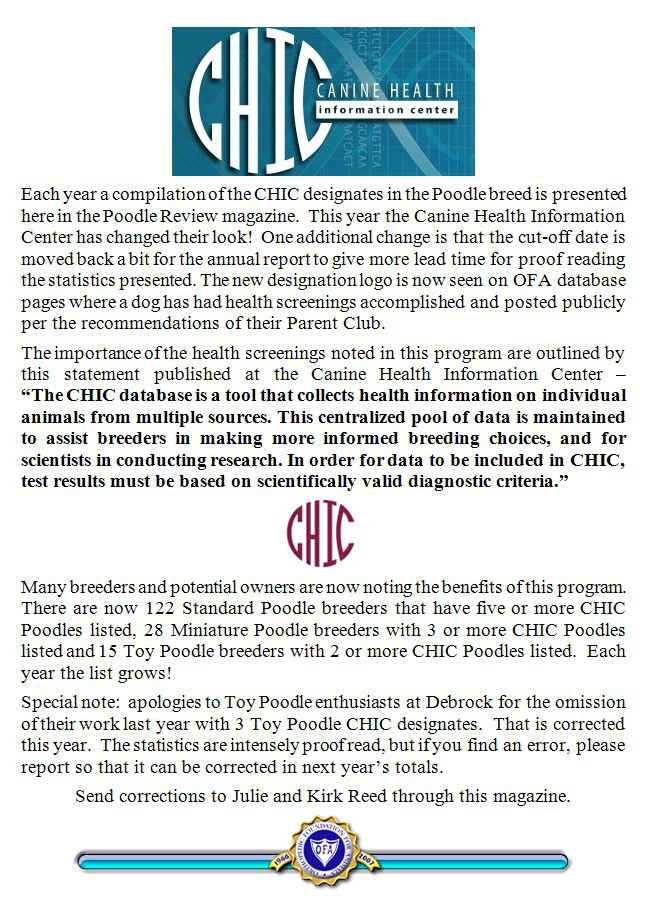
If
the breeder you are researching, doesn’t at least make that list, or is
very low on that list, consider also weighing that information very
heavily. Check to see if dogs in the pedigree are designated
CHIC. A breeder not performing health testing, but producing
Standard Poodles is doing so at great, selfish risk to the gene pool and a
breeder that is testing and not publicly telling is just not doing any
favors for the breed.
5. Has there been any occurrence of
bloat or gastric torsion, seizure, epilepsy, diabetes, thyroid disease,
hemolytic anemia, allergic skin diseases, thrombocytopenia, allergic
gastroenteritis or Addison's disease in the sire or dam or their
relatives? These problems can be hereditary and seem to
be more prevalent in some lines.
Answer from Tiara Standard Poodles:
Tiara Poodles would not mate dogs that
exhibited the above disorders. In very few cases relatives are known to
have been afflicted with Addison’s disease or bloat. Old age mitral
valve insufficiency and old age splenetic disorders could be noted in a
few cases over the age of 10 years as well.
We
can test for Thyroid disease and register the results with the OFA (www.offa.org
).
We
have adjusted our husbandry practices significantly over the last 15 years
to conscientiously
do the least amount of harm to the immune systems of the dogs in our care.
You can read discussion concerning those efforts on our ABOUT TIARA
STANDARD POODLES page. http://www.tiarapoodles.com/about.htm
Addison’s disease is deemed polygenetic and most likely more of the
above disorders also take several genes coming together to have the
disease heritable. From my many years of in depth experience with
Standard Poodles, a dog’s temperament and how they handle their
environment(s), change of routine and other stress due to immunizations,
wormings, and just any everyday stress, play an important part in
the expression of these diseases noted above. Addison’s disease is
thought to be carried in the genetic make-up of 75% of Standard Poodles;
more than any other dog breed per a study at the
6.
Ask to look at the whelping room and puppy areas. Note total environment.
Record
and answer to each of the following:
Is everything clean?
Do puppies have toys to play with?
Do puppies have fresh water?
Do puppies have room to exercise?
Are puppies clean and groomed?
Look at as many relatives as possible!
(Note: Weeping tear-stained eyes are not normal)
Are they friendly and outgoing; wanting to meet and show off for you like
good Poodles?
Are they apparently healthy?
This may be your only insight into your puppy's temperament and overall
quality.
Answer from Tiara Standard Poodles:
Tiara Poodle puppies are the fruits of
years of labor, experience and concern for the breed. Tiara Poodles are
fed a healthy, all-natural diet and vaccinated on a holistic schedule.
Vaccines are not started until 14 weeks of age. Puppies produced
here have had negative fecal analysis for internal parasites for two
generations now. Julie Borst Reed, Breeder, has raised the Best Std.
Poodle Puppy at the National Poodle Show on 3 occasions! Tiara
Poodles have also been reared to perform brilliantly in agility, as
assistant dogs, therapy dogs and in amusement park shows.
The
first few weeks of the pups’ lives finds the breeder by their side
nearly around the clock; actually sleeping by them! We recommend you
meet the mother dog (known as dam) of the litter you are considering and
make certain she likes to please, comes when called (off leash), and is
friendly with all she greets, for you to determine more closely the impact
she’s had rearing your new puppy.
7. Ask about the breeder's older dogs
and their life expectancy. Standard Poodles should live 11 to 15 years.
Answer from Tiara Standard Poodles:
12 to 14 years – we are currently
combining these two lines developed. By reducing the coefficiency
seen in our inbreeding levels to under 6%, as recommended by the top
scientists that have studied such things, we are statistically suppose to
note greater longevity. We certainly see a noted improvement in
overall health so far since our mission on this began in 2002. It
was stated by Dr John Armstrong that a dog with inbreeding at the level (COI)
of 25% (determined at the 10th generational level) is statistically going
to live 3 years less than a dog with the inbreeding level of 6%.
This is important.
You
can determine COI levels for 10 generations to use as an important
comparison of puppy choices when shopping. Go to www.poodlepedigree.com
Sign in (it’s free and bug free). Use your actual e-mail address
as the Login and make up your own password. Over 130,000
Poodles’ pedigrees from all over the world are in the database. If
you have a pedigree that is not included, please add the dogs. Start
by searching for the sire – is he in the database? If not, add him
– make certain to use exact spelling. Check to see if the dam is
in the database, if not add her. Then start by checking to see if
the sire’s sire is in the database and add him if he is not. You
may not need to enter any dogs, or you may need to enter many dogs from
the pedigree you are investigating.
Once
you have all of the dogs you can locate entered in the database until they
connect with the rest of their pedigree already in the database (it WILL
happen! Ask the breeder to assist you and or write to the owner of Poodle
Pedigree, Karen Mills, for assistance). You want to make 5,
hopefully 10 generations; the more generations included, the more you can
learn. Ten generations is the goal and under 6% the desired number
per the scientists that study canine reproduction/longevity issues.
You can enter a dog in the test breeding section (not it’s relatives –
they have to be officially in the database – but one you may be
considering) and on most Sundays the Poodle Pedigree database is shut down
so that it can process the Wright’s coefficient of inbreeding on all of
the pedigrees in the database. Once the database has processed
this work, you will then be able to go view the “Genetic Information”
for that pup you had in mind. At Tiara Standard Poodles, we
always give you a link to the dogs’ pedigree information on
PoodlePedigree.com. There is no guessing here, we take our dog
breeding very seriously.
8. How many years of experience does
the breeder have?
Answer from Tiara Standard Poodles:
Breeding an average of three litters
per year since 1976.
9. How many litters a year do they
produce and for what reason?
Answer from Tiara Standard Poodles:
Partially answered above. Tiara
Poodles are bred to produce the best all-around Standard Poodle; to
provide deserving owners with a devoted, healthy pet of incomparable
temperament. We appreciate the breed and are not here to change it
(we prefer the healthier outlines seen of the Nine-teen Eighties style of
type – better fronts and not so much exaggeration of neck carriage in
the wrong, held back arch which is actually a weakness termed ewe neck).
We want to enhance the varieties athleticism and longevity and give the
best individuals to the gene pool that we can. Our dogs regularly compete
in a variety of sanctioned venues where their temperament, conformation
and willingness to please are judged some of the finest. Our
commitment to excellence and our dogs’ ability to continually prove that
we are breeding along a very good path is our creed.
If the answer above is "for the money," walk away. People
breeding for just the money or stating they produce one thing (Poodles for
hunting or assistance for instance) but producing litter after litter that
no individuals are tested for that particular “thing” (or even go to
hunt/assist homes), most likely do not have the welfare of the breed as a
priority. Also, if not accomplishing verifiable health testing in
addition to not comparing their stock in any type of formal competition or
actually producing dogs that go to do benefit for man in any way (hunting,
therapy, service dog, entertainment, etc.) than they are just using the
dogs and not providing (proven)
better dogs for the gene pool or the general public. Please do not
further their impact by buying a puppy from this type of puppy producer.
The Standard Poodle gene pool is already weakening and according to some,
once the average inbreeding coefficiency reaches 22% (and others state
25%), the inbreeding will have crested to the point of no return –
without outside blood (and that is one of the reasons we are very
fortunate to have varieties within our breed unlike many breeds in the
same desperate condition of over-inbreeding due to a closed pedigree
registry and popular sire syndrome).
10. Is the breeder willing to take the animal back if you can no longer
keep it?
Answer from Tiara Standard Poodles:
Absolutely - Yes
Breeders do have a responsibility to the animal's welfare even
after the puppy is sold.
Ask for at least three references from people who own puppies purchased
from this breeder. Ask each about their dog's health and temperament.
NAME PHONE # or E-MAIL ADDRESS
1.
2.
3.
NAME
PHONE # or E-MAIL ADDRESS
1.
Carol Lang,
e-mail
address: carollang@cox.net
2. Alexa Fairbairn,
e-mail address: diva@divaherself.com
3.
Trish Savage,
e-mail
address: pmcclintick@san.rr.com
4.
Gail
Yarborough,
e-mail
address: Gailmy3@aol.com
5.
Valeska
Humphreys,
e-mail
address: vhumphreys@satx.rr.com
Additional
information -
Take
your puppy to your veterinarian within 48 hours. Your puppy should be
examined thoroughly. If problems are found return puppy immediately to the
breeder with the veterinarian's report. The breeder should be willing to
guarantee the puppy's health for a specified time and per most states’
law you should be given at least 48 hours plus Sundays and holidays.
Genetic testing and health screenings
are done to help breeders avoid passing on genetically transmitted
diseases and anomalies. There is no line of living creatures totally free
of genetic problems, including humans, but the incidence of problems can
be markedly decreased by careful and selective breeding. Take each of
these points into consideration when choosing your next Standard Poodle.
Note: There is no such thing as a registered Royal
Standard Poodle. The term is used as a marketing gimmick to
imply that your puppy will grow extra large. There are some breeders
ignoring the problems with the overly tall Poodles and yet still produce
them along with the many health problems that give these giants a shorten
lifespan. A Standard Poodle is a Poodle that will measure over 15
inches tall at the shoulder. In the FCI, the European pedigree
registry and show scene there is actually a limit of 24 or 25 inches tall,
The average Standard Poodle in North America is around 22- 23 inches tall
at the shoulder for females and 25 ½ - 26 ½ inches tall at the shoulder
for males. Weights for females are 40 to 58 lbs and males range from
48lbs to 65 lbs. It is best to ask the height and weight
of the parents of the puppy you are considering. At Tiara, we
often have smaller Standard Poodles available because we are rebuilding
our foundation and have utilized miniatures with some of our pedigrees
(not all). Other breeders refer to these as Moyen or Klein
because these are terms in
Showing dogs, as in many other sports, has started to lose the heart of
its intent, especially in venues where artificial substances are used to
enhance the entries. There is an all-encompassing need to win at any
cost. Professionals brag how they can make a silk purse out of a
sow’s ear type of thing. Unfortunately, its the welfare of the
dogs and even the exhibitors' own families at times that suffer. To
achieve goals you must be focused, but as respected judge Jim Clark once
wrote on this subject, "you also must be well-rounded."
There seems to be more harmony in the family when everyone is involved or
able to be happy for the person accomplishing great strides with their
dogs. At Tiara Std Pdls, both Julie and Kirk Reed work very
hard each day in the care of their dogs. It is a wonderful team
effort and the dogs shine because of that bond.
So hopefully your new puppy will come from an environment where quality
not quantity mattered, and where how well a dog looked counted as much as
whether he came when he was called. Where dogs ate happily on their
own and were not force fed to the appearance of a healthy appetite in the
showring (this is a matter I believe should be looked into by humane
authorities). And also, where the dogs in the show pictures first
sent to you are the same color as when you met them in person. Oh
yes, “color enhancing," as it is called, could be easily tested for
as is done at dog shows in
Again, there are so many other concerns that come first. Make
certain that the puppy you bring to your home has several generations
tested and certified for the most common genetic defects of its breed
through DNA testing and health screenings of the close relatives as well.
The reports should be noted at www.offa.org. Breeding without
testing the sire and dam should be considered an injustice as long as so
many puppies are produced in this country without ever having a chance at
even a mediocre home. And just before health concerns is the
importance of a sound temperament. In each breed you find good and
bad representatives. This is your dog for the next decade or more
– take the time, make the investment in a stable dog from well-tested
stock, with lower than average inbreeding. Dogs that will be welcome
anywhere are a benefit to dog lovers everywhere having a chance to keep
dogs as pets in the future. After all your research, if you follow
these guidelines, you will know that your dog will be a benefit to the
breed’s reputation as well as his litter a benefit to the gene pool for
the variety.
In the Standard Poodle Variety of Poodles, tracing a top sire of the
1970’s back to 1928, I lost count at just over 200 crosses to a dog
named Clown. How incredibly tightly bred the lines already are I
thought and this task I performed in the early Nineteen-Nineties!
So, of course that experience is probably approaching double the count on
a top POPULAR sire of today. It is my experience that the time is now to
stop the high level of inbreeding. It may look like linebreeding,
but if the average inbreeding in Standard Poodles, which is currently
around 20% (10 generations), crosses that 22% or 25% mark, well . . . .
Things are already not ever going to be the same, but perhaps you can help
our breed by selecting from a breeder producing puppies with a 10% COI or
less.
Happy Poodle Shopping! You are now armed with the correct questions and you can compare answers. By you taking the time to read, study and implement this page of information and its links, you will have the opportunity to enhance the Standard Poodle gene pool. How? Well, not just by purchasing your new dog from a proper Breeder, but by asking the questions of the breeders you may bypass – hopefully they will learn about better breeding from you! If the concerned shopping public learns to be better shoppers (and that ever-growing OFA database is going to truly have a very good influence on their ability – in all breeds), than those that wish to be better Breeders will be boosted into becoming such because the public is demanding better dogs as companions. Much of what is listed above in the questionnaire is what separates a breeder from a “miller.” It comes down to quality of care and the ethics of the mission.
Home
| About
| Puppy Comes Home
| Equipment
Recommended Diet |
FAQs About Feeding Raw
Recommended Vacc. Schedule |
Vaccination Decisions
Breeder Ethics Questionnaire |
Photo Gallery
Recent
Litters | A
Breeder's Life
| The Dapper Dog by TIARA
|
|
||
|
|
|
|
|
Site
designed by POL |
||
